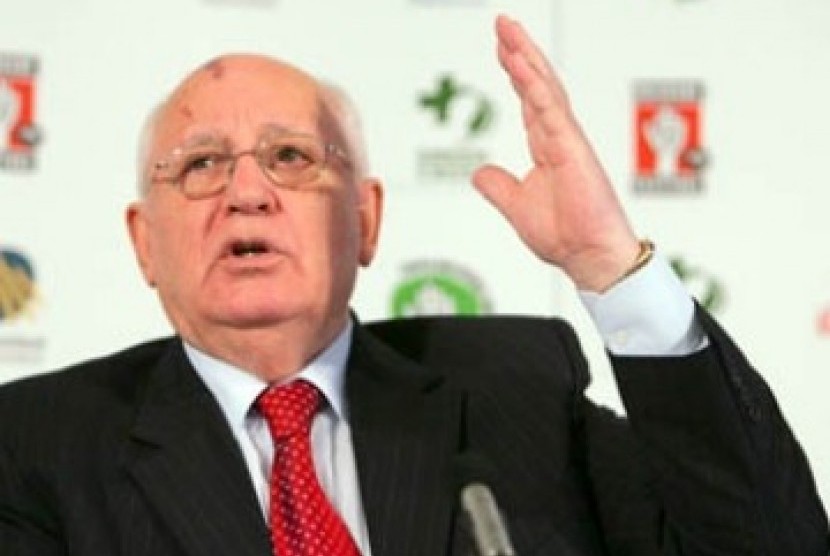REPUBLIKA.CO.ID, MOSCOW -- Europe prepared Thursday to draft even tougher sanctions against Russia over Ukraine as ex-Soviet leader Mikhail Gorbachev warned against the danger of an increasingly isolated Kremlin fighting back.
The last Soviet leader's words of caution came with the daily death toll in Ukraine's separatist east spiking again with the nine-month war threatening to turn into a lasting conflict that keeps Europe on constant edge.
Gorbachev said the West's decision to respond to the violence by blaming Russia and cutting it off from access to US and European capital markets threatened to spiral into open warfare with dire consequences across the world.
"Where will that lead all of us? A Cold War is already being waged openly. What's next?" the 83-year-old Nobel peace prize winner asked.
"Unfortunately I cannot say for sure that a Cold War will not lead to a 'hot' one."
Pro-Russian insurgents last week pulled out of peace talks and announced a new offensive that was followed by a rocket assault on the strategic port of Mariupol in which 31 civilians died.
Rebel commanders later distanced themselves from the bloodshed despite being blamed for it by international monitors on site.
But they have followed through on their threat to push into lucrative eastern industrial lands that still answer to Kiev's pro-Western government under a September deal approved by the warring sides in Belarus.
"We pronounce the Minsk agreements dead," Donetsk separatist commander Eduard Basurin told reporters.
"The version that was signed no longer applies."
The United States and its European allies view the latest rebel surge as part of a proxy war launched by Russian President Vladimir Putin in reprisal for last year's ousting a Kiev's former Kremlin-backed government.
Ukrainian President Petro Poroshenko -- his ill-equipped army once again on the defensive -- has also been working the phones and encouraging world leaders to keep the pressure on Putin and his inner circle of ex-KGB agents and tycoons.
Poroshenko's office said US Vice President Joe Biden on Wednesday "expressed his firm support for the Ukrainian president's actions and spelled out the possibility of expanding sanctions against Russia in case of a further escalation."
Stiffer penalties
EU leaders unanimously backed more Russian sanctions in a rare statement adopted outside a regular Brussels session on Tuesday.
Greece and Cyprus later distanced themselves from the statement but are not expected to fight new penalties the bloc's 28 foreign ministers draft on Thursday.
Previous Western measures and a coinciding slide in oil prices have plunged Russia into recession and seen Standard and Poor's slap a "junk" rating on Moscow's foreign currency debt.
The downgrade threatens to further alienate Western investors and burdens Russia's economy with the same failing grade it struggled with at the start of Putin's 15-year rule.
Yet the pain appears to have done little to alter Putin's tough approach to his western neighbour or to dent Russians' monumental trust in the Kremlin chief.
Some analysts think Putin may be calculating that EU nations are too busy bracing for the consequences of a possible Greek exit from the euro to undermine their economic relations with Russia any further.
"The Russian president is likely calculating the EU is distracted by the Greek elections and is highly resistant to increasing sanctions while the eurozone economy flounders," the Eurasia Group political risk consultancy said in a research note.
"Putin seems also to have reasoned that sanctions will stay in place or get worse regardless of what he does."
The Kremlin -- having long denied backing the rebel fight -- on Thursday continued to reject the notion that it could somehow rein in the insurgency.
"Mediators cannot... solve the conflict on their own," Kremlin administration chief Sergei Ivanov told a meeting of Russian governors and mayors.
"This can only be done by the two warring sides themselves."
Gorbachev -- either despised or ignored by most in Russia -- is revered in the West as an elder statesman who helped erase the threat of global nuclear warfare by overseeing the peaceful end to the Cold War.


